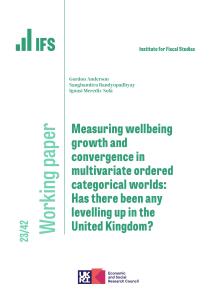A steady 80 per cent or so of people in the UK have, for decades, said that they were concerned about inequality. At the IFS we are in the middle of our biggest ever project, working with the Nobel laureate Angus Deaton to look at the causes, consequences and remedies for inequality. But why? What is it about inequality that seems to matter so much?
That is a surprisingly difficult question to answer. It’s easy to explain why we worry about poverty, about some people not having enough, but why should we be concerned simply that some people have more than others? We don’t tend to think that differences in height, or sporting or musical ability are issues of moral concern. So why do we worry about differences in income, wealth and other measures of economic success?
It is tempting to draw a distinction between success that is deserved, as a result of ability or hard work, and that which comes as a result of blind luck or, even worse, immoral or illegal behaviour. Many of us claim to be concerned about levels of inequality, but few would begrudge Emma Raducanu the riches that will flow her way. Striving for equality of outcome risks endangering not only incentives for success, but also the sense that some deserve more than others for their effort, success and contribution.
That’s why equality of opportunity, for many, has a much stronger attraction as a moral objective than equality of outcome. Is it really possible though, to make such a sharp ethical distinction, let alone one that can plausibly be translated into policy? For one thing, reducing inequality of opportunity among subsequent generations will itself require reducing current inequalities. And then, is the genetic inheritance of talent, the familial encouragement to achievement or inherent motivation, really so different from straightforward inheritance of wealth? Some are lucky to be born with genes that make success possible, others are lucky to have rich parents.
More can and should be done to level the playing field children face. But true equality of opportunity is probably as unattainable as true equality of outcome. And even if it were attainable it wouldn’t be enough. Outcomes matter, even among people who had equal opportunities at the start.
Perhaps we can get at an answer by coming at this from a different direction. There are some inequalities we all agree are ethically indefensible. We rightly abhor slavery and also more subtle ways in which rights of citizenship may be undermined. Limiting access to the law, education, voting, political influence or work according to morally irrelevant factors, such as ethnicity, gender or age, is wrong. Perhaps the equality that really matters is what philosophers have called “relational inequalities”. In work for our review the philosophers Debra Satz and Stuart White suggest we might “understand the ideal of ‘equality’ as fundamentally about the nature and quality of social relations between people rather than about the just distribution of goods”. It is about treating all of us as having an equal status as members of society.
That’s why some groups losing out because they are discriminated against by race or gender, education or where they live, seems so objectionable. There is evidence that the Brexit vote was boosted by those who felt they had not been taken seriously for far too long. We are all aware of the government’s “levelling up” slogan, and the idea that some areas are “left behind”. Polling evidence is clear that these geographical inequalities are particularly concerning to people, more evidence perhaps that the worst outcome of inequality arises when people feel they are not treated with due respect as citizens; when they are not listened to. That loss of respect is more likely where income and wealth inequalities are high. That may be as likely in an avowedly meritocratic society where the successful congratulate themselves on their moral superiority over the less successful, as it is in a society in which inherited wealth provides access to political and economic power. Economic inequalities are especially problematic where they create or exacerbate these relational inequalities, whatever the source of the economic inequality.
Not that we should see all sources of income and wealth inequality as morally equivalent. Those that arise from monopoly power or exploitation are more worrying than those that arise from the fair operation of the market. Inequality arises both because people are rewarded for effort and ability and because the cards are stacked against those who start from less advantaged backgrounds and in favour of the rich or well-connected.
We know from surveys that people understand these different routes to inequality. Some put more weight on the idea that inequality is down to people’s own efforts. Others put more weight on inherent unfairnesses in the way society operates. Clearly both matter. Any discussion of inequalities needs to recognise both. We also know from surveys that concern about inequality often does not translate into support for government redistributing income and wealth. Policies that deal with the underlying problems of the abuse of market power, discrimination and opportunity through education, may gain more support. We should stop theft, not tax its ill-gotten gains.
Whatever their source high levels of inequality can be damaging. Their clear association with inequalities in health and longevity, and the way in which inequality begets inequality as concentrations of wealth are passed down the generations all matter and are reasons for policy action. But when economic inequalities start to undermine our sense of equal citizenship, as they seem to have done in the UK, then the need for action becomes urgent.
This article was first published in The Times and is reproduced here with kind permission.








